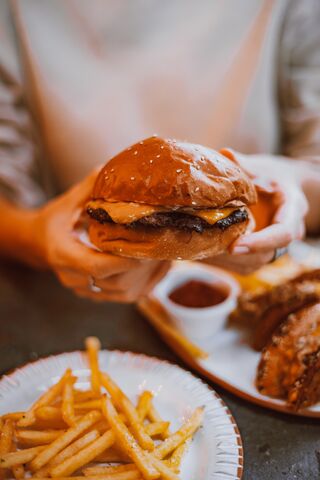Forgiveness
Craving Fatty Foods? Your Intestines May Be to Blame
Fat sensors in the intestines, not tastebuds, drive the appetite for fat.
Posted September 30, 2022 Reviewed by Ekua Hagan
Key points
- New research shows that mice crave fat even when they can't taste it.
- The cravings seem to be driven by two groups of endothelial cells that fire when fat enters the intestines.
- Turning off those endothelial cells, or the neurons that receive their messages, puts a stop to fat cravings.
- The findings could offer new ways to help human beings limit fat consumption.
Can’t get enough bacon, butter, or ice cream? It turns out it’s not their taste that makes these fatty foods irresistible but their effect on your gut.

According to a new study published in Nature, researchers at Columbia University's Zuckerman Institute offered mice two options for drinking water: one containing dissolved fats and another containing sweeteners. In just a few days, the rodents developed a strong preference for the fatty water.
Even when the team genetically modified the animals so they could no longer taste fat, they opted for the fat-spiked drink.
When researchers examined the mice, they found two groups of endothelial cells were signaling the brainstem when fat entered the intestines. It was these messages that drove the animals to consume more fat, without even being able to taste it.
"Our research is showing that the tongue tells our brain what we like, such as things that taste sweet, salty, or fatty," said Charles Zuker, the study’s senior author and a professor of biochemistry, molecular biophysics, and neuroscience at the Zuckerman Institute. "The gut, however, tells our brain what we want, what we need."
A New Way to Block Fat Cravings
Researchers discovered that the rodents’ appetite for fat could be shut down using drugs that prevented the intestinal cells from signaling. Genetic modifications that deactivated the neurons receiving those signals in the vagal nerve or central nervous system also put an end to fat cravings.

"These interventions verified that each of these biological steps from the gut to the brain is critical for an animal's response to fat," said lead study author Mengtong Li, a postdoctoral researcher in Zuker’s lab. "These experiments also provide novel strategies for changing the brain's response to fat and possibly behavior toward food."
High-fat diets have been linked to diabetes, heart disease, cancer, and even Alzheimer’s. Understanding the biological reasons we crave high-fat foods could help us limit our consumption and avoid long-term health consequences.
"The overconsumption of cheap, highly processed foods rich in sugar and fat is having a devastating impact on human health, especially among people of low income and in communities of color," said Zuker.
"The better we understand how these foods hijack the biological machinery underlying taste and the gut-brain axis, the more opportunity we will have to intervene."


